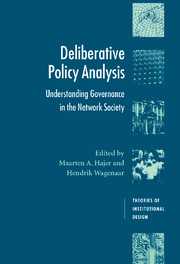Book contents
- Frontmatter
- Contents
- List of contributors
- List of figures
- List of tables
- Preface
- Introduction
- Part I Policy conflict and deliberation in the network society
- 1 Collaborative policymaking: governance through dialogue
- 2 Place, identity and local politics: analysing initiatives in deliberative governance
- 3 A frame in the fields: policymaking and the reinvention of politics
- Part II Rethinking policy discourse
- Part III Foundations of deliberative policy analysis
- References
- Subject index
- Author index
3 - A frame in the fields: policymaking and the reinvention of politics
Published online by Cambridge University Press: 22 September 2009
- Frontmatter
- Contents
- List of contributors
- List of figures
- List of tables
- Preface
- Introduction
- Part I Policy conflict and deliberation in the network society
- 1 Collaborative policymaking: governance through dialogue
- 2 Place, identity and local politics: analysing initiatives in deliberative governance
- 3 A frame in the fields: policymaking and the reinvention of politics
- Part II Rethinking policy discourse
- Part III Foundations of deliberative policy analysis
- References
- Subject index
- Author index
Summary
Could policymaking be constitutive of politics? Conventionally, policymaking is conceived of as the result of politics. In this view classical-modernist political institutions seek to involve people in politics via a choice of elected officials who are subsequently supposed to represent the interests of their voters, initiate policy and oversee its implementation. But what if people do not always have clear-cut identities or preferences? What if they regard ‘party politics’ with a certain cynicism, and are much more ‘spectators’ than participants (cf. Manin 1997)? Is that the end of politics? This chapter argues that this is not necessarily true. Citizens could also be seen as political activists on ‘stand by’ who often need to be ignited in order to become politically involved. This creates a new role for policymaking. In many cases it is a public policy initiative that triggers people to reflect on what they really value, and that motivates them to voice their concerns or wishes and become politically active themselves. Public policy, in other words, often creates a public domain, as a space in which people of various origins deliberate on their future as well as on their mutual interrelationships and their relationship to the government.
The idea of a network society only adds to this. Nowadays policymaking often takes place in a context where fixed political identities and stable communities always be assumed.
- Type
- Chapter
- Information
- Deliberative Policy AnalysisUnderstanding Governance in the Network Society, pp. 88 - 110Publisher: Cambridge University PressPrint publication year: 2003
- 167
- Cited by

